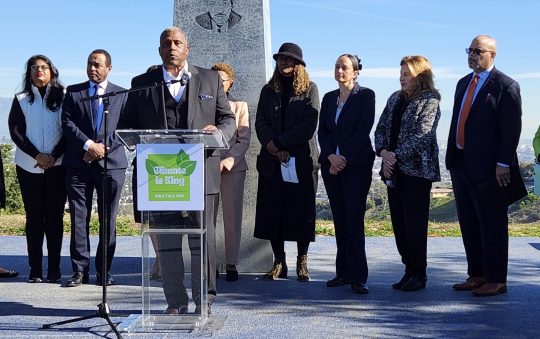
The L.A. Sentinel Wildfire Recovery and Rebuild Conference supplied a plethora of workshops for those who were affected by the Altadena and Eaton fires. Some workshops provided legal counsel, offered property assessment guidance, aided in hiring architects and contractors, and helped with mortgages. Others focused on wellness and fire debris removal.
The Los Angeles County Public Works hosted a workshop providing information on debris removal. Property owners must decide whether to have the U.S. Army Corps of Engineers (USACE) remove fire debris and hazardous items or not.

Property owners have until April 15 to decide. If owners choose to opt out of having the government agency remove debris and hazardous materials, they must hire a qualified contractor with their own money.
If an owner opts in, USACE will remove debris, and the County of Los Angeles will obtain reimbursements after they settled their removal claims with their insurance. Opting in does not cover basements, cellars, or driveways.
Owners who opt out will have to get a Fire Debris Removal Permit; FEMA will also not give them reimbursements. L.A. County Public Works provided information about Right-of-Entry forms that owners need to complete if they plan to opt in, along with frequently asked questions. For more information about debris removal, visit recovery.lacounty.gov. For the Debris Removal Hotline, call (844)347-3332.
Working with different agencies and companies to create a new normal can be mentally taxing and overwhelming. The Wildfire Recovery and Rebuild Conference also provided workshops that helped attendees manage their emotions and mental health while they persevere through their circumstances.
In their workshop named “Bubbles, Bonding, and Braving the Storm: Supporting your child and yourself through loss and trauma” Wellnest implemented trauma-informed care to attendees. They explained how emotions affect the body through discussion and diagrams.
“We’re using the TFCBT model, trauma-focused cognitive behavior model, to teach the first four components, which are the education and relaxation, effective modulation, cognitive processing,” said Wellnest intensive services department clinical supervisor Shantel Wilson-McGee. “We need to help folks build a sense of confidence and competence in taking care of themselves.”
The workshop leaders talked about how feelings connect with thoughts and behaviors. Wellnest wants to help refocus negative thoughts so attendees can remain calm as they navigate through their circumstances.
“I was able to really think more about how to take unhealthy thoughts or fears or any of those behaviors that are not going to do my body well, to move over to positive,” said parent advocate Mary Lee. “A lot of this I’m going to be taking back to some of our wildfire victims who are special needs families.”
Wellnest members also led progressive muscle relaxation exercises. The organization also provides medical consultation along with counseling for individuals and families. For more information, visit https://www.wellnestla.org/
Mindful USC hosted a workshop on mindfulness practices. The workshop discussed the definition of mindfulness and how it helps attendees cope with the stressors they face.
“It can help individuals with their own spiritual health,” said USC office of religious and spiritual life director of student engagement programs Robin Mitchell -Stroud. “It really does help us get present and get out of that part of our brain that’s fight and flight … and helps us to get into that part of our brain where we can be more thoughtful.”
Mindfulness can improve both mental and physical well-being. Benefits include improving sleep and easing anxiety. The mindful practices shared in the workshop included breathing techniques, journaling, and sensory awareness.
For more information about Mindful USC, visit https://mindful.usc.edu/.
While the workshops provided information and resources to wildfire victims, it also gave them a chance to share their experiences and build community.







